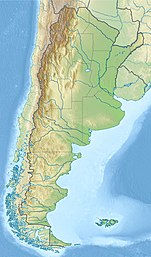Gutiérrez Lake (Spanish: Lago Gutiérrez) is a lake of the lake region of northern Patagonia in the province of Río Negro, in Argentina. It is of glacial origin, being a Moraine-dammed lake. The lake is connected to Nahuel Huapi Lake. It was named by explorer and naturalist Francisco P. Moreno as an homage to his academic mentor Juan María Gutiérrez.
| Gutiérrez Lake | |
|---|---|
 | |
| Location | Bariloche Department, Río Negro Province, Argentina, in Patagonia |
| Coordinates | 41°11′12″S 71°24′37″W / 41.18667°S 71.41028°W |
| Type | Moraine-dammed lake |
| Primary outflows | Gutiérrez River |
| Basin countries | Argentina |
| Surface elevation | 2,510 ft (770 m) |
| Islands | 0 (no islands) |
| Settlements | San Carlos de Bariloche |
The lake harbors several species of trout including rainbow trout, brown trout and brook trout which attract anglers from the world over. [1]
Despite being nowhere near any ocean and being at high altitude, the lake is also home to the kelp gull and the blue-eyed cormorant (Phalacrocorax atriceps), otherwise strictly marine birds. [2] Archived 2011-01-12 at the Wayback Machine [3] [4]
The lake's clear waters are very susceptible to climate change and have an average surface temperature of 45 °F (7 °C). Hypothermia is one of the risks bathers must endure. Kayaking is a popular sport on this and adjacent lakes.
The lake is located near San Carlos de Bariloche (about 12 km), and it is a popular tourist attraction. It has several good spots for having a picnic or sunbathing.
Villa los Coihues
editIn the northern shore of the lake there is a village called Villa los Coihues (Coihue is the popular name of the tree Nothofagus dombeyi). It is a small but thriving community.
In this village is located the "Dr. Rosendo Pascual" geological and paleothological museum which, although small, exhibits a large collection of rocks and fossils. [5]
